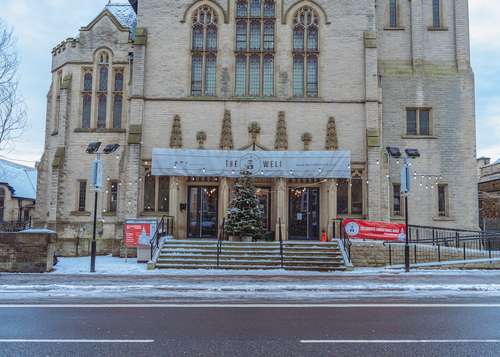The air in the communities of Greater Manchester has been thick with worry and uncertainty. Many of us are noticing a shift in attitudes as local asylum seekers, residing in hotels like the Cresta Court and Ashley, face increasing hostility. The image of these hotels, once symbols of temporary shelter, now comes intertwined with concern and fear among local residents and church leaders alike. When we think about it, isn’t it unsettling to see compassion replaced by suspicion?
Across the region, church leaders are stepping forward with voices full of empathy and urgency. Their hearts, firmly rooted in biblical values, can’t help but reach out to those in distress, while lamenting the mounting tension and hostility towards asylum seekers. They know that every act of opposition is a challenge not just to immigration policy but to the very ideals of social justice and faith community solidarity.
Rising Concerns and the Call for Compassion
In recent weeks, there has been a noticeable energy among religious leaders in Greater Manchester. They are not just reacting to immigration issues but are actively advocating for refugee protection and humanitarian aid. Church leaders see this as a pivotal moment where empathy should triumph over fear.
Many pastors have expressed their concern about how easily fear can take root when people feel threatened by differences. It’s like watching a tree bending in a storm, its branches desperate to seek shelter. One pastor remarks, without directly naming, that the push-back against asylum seekers is a bellwether for broader societal challenges. The tone is clear: compassion and human rights must be at the heart of community response.
Some church leaders have taken the initiative to hold forums and prayer meetings. They engage with local residents to discuss the root causes of hostility towards refugees, emphasizing that safety and support can coexist. Their approach mirrors the idea that open conversation is a remedy to fear, a belief that our shared humanity can bridge even the deepest divides.
Addressing the Impact on Asylum Seekers and Community Stability
This section dives into the impact that the growing intolerance has on both the asylum seekers and the local communities that host them. There is a stirring conversation among religious leaders about finding a balance between safeguarding community values and upholding the rights of refugees.
For many asylum seekers, residing in local hotels like Cresta Court and Ashley is a temporary shelter fraught with uncertainty. They often face isolation and, at times, direct hostility from neighbors who misunderstand their plight. It’s as if a protective shield is slowly being eroded by winds of discord. Religious figures argue that this environment can have lasting adverse effects not only on the lives of these vulnerable individuals but also on the broader fabric of community spirit.
On several occasions, church advocacy groups have noted that religious leaders are applying pressure on local officials to implement measures ensuring better integration. They appeal to the moral conscience of local government by highlighting that a community is only as strong as its willingness to embrace those in need. This plea for a humanitarian approach has sparked various initiatives, including offering language classes, legal advice, and counseling services to new arrivals.
Often, sermons in local churches are laced with messages about love, respect, and the biblical injunction to welcome strangers. It is within these spiritual spaces that many find solace and guidance on how to deal with complex immigration issues. The conversations are not just about policy – they’re personal, invoking the sacred notion of every child of God being worthy of dignity and respect.
Community Initiatives and Religious Response
Not every story in Greater Manchester is one of despair. In fact, there is a strong undercurrent of community response and church initiatives that aim to uplift both the asylum seekers and the local population. This section offers a closer look at the steps being taken by faith communities to combat asylum seeker hostility.
Several local churches are banding together to create support networks. They are setting up volunteer groups dedicated to providing essential services that range from food distribution to companionship and emotional support. Many church leaders describe these acts of kindness as proactive steps to reclaim the narrative and replace fear with understanding. Their efforts remind us that much like a quilt, stitched together by varied yet individual pieces, communities thrive on shared support and resilience.
Community events and interfaith gatherings now serve as platforms for discussion and mutual understanding. Imagine a town hall meeting where people from all walks of life engage over coffee, discussing how immigration policies impact each one of them. These meetings have become crucial spaces where local residents realize that supporting refugees is not about neglecting their own needs. Instead, it’s about nurturing a balanced, humane approach that fosters lasting relationships and mutual growth.
These initiatives are not without challenges. Church leaders often have to navigate politically charged conversations while emphasizing the universal message of mercy. The contrast between political rhetoric and on-the-ground reality is striking. While some political narratives sow seeds of division, the voices from the pulpit and grassroots campaigns work diligently to re-establish trust and common humanity. They are gently saying, “We are in this together.”
Looking Ahead: A Path Toward Unity and Social Justice
The future might seem uncertain, but inspiration is gleaned from the solidarity shown by religious communities, local advocacy groups, and compassionate citizens alike. This section explores the hopeful strides and potential policies that church leadership is advocating for in the realm of immigration issues and asylum crisis management.
While tension and suspicion may mark the current climate, many faith leaders believe that the path toward unity requires sustained dialogue and progressive policies. Their call to action is simple yet profound: treat each individual with dignity and fairness. They see it as a clarion call for social justice, urging local governments to re-examine immigration policies that inadvertently foster disunity and despair.
As we navigate these challenging times, it is encouraging to witness church initiatives that echo the sentiment of refugee support and community response. The emphasis on legal protections, humanitarian aid, and faith-based advocacy paints a picture of hope, one where every person finds a place of belonging and care. The promise lies in our collective ability to create communities where diversity is embraced rather than feared.
It’s like piecing together a mosaic where each tile, no matter how different, contributes to a beautiful and cohesive image. Church leaders maintain that through sustained efforts and compassionate outreach, the hostile environment can gradually transform into one of mutual respect and reinvigorated community spirit.
Ultimately, the story of asylum seeker hostility in Greater Manchester is as much about human struggle as it is about resilience and hope. Through church advocacy and community-driven initiatives, there is an emerging narrative of unity and support that reminds us that compassion can indeed overcome division. In this ever-evolving situation, it is up to all of us to listen, learn, and act in the spirit of kindness and justice.




